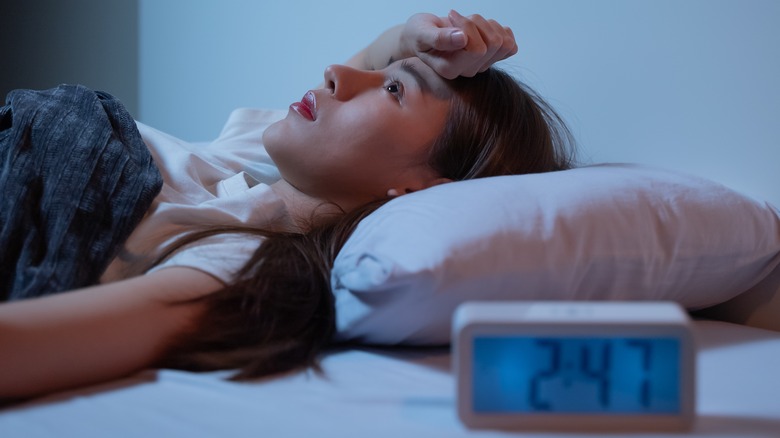Skipping Breakfast Has An Unexpected Effect On Your Sleep
In many households, mornings are the most chaotic time of day. Between getting ready for work, packing school lunches, and hitting the drive-thru for that non-negotiable cup of coffee, breakfast is easily the first thing to fall by the wayside. In fact, a 2016 study published in The American Journal of Clinical Nutrition found that approximately 25% of Americans skip breakfast every day. An alternate 2022 study involving kids and teens in Australia found that, compared to 55% of youth who never went without breakfast, over 17% reported occasionally skipping a morning meal, 18% stated that they skip breakfast often, and 9.5% of students said that they always skip the most important meal of the day.
If eating breakfast isn't a part of your regular routine, you probably don't feel particularly hungry first thing in the morning. Therefore, skipping breakfast isn't such a big deal, right? As it turns out, that cup of coffee may not be enough. Research shows that opting out of breakfast can potentially sabotage the quality of your sleep.
Skipping breakfast can disrupt your circadian rhythm
If you're passing up that plate of eggs or cup of Greek yogurt on your way out the door, you may be compromising your quality of sleep later that night. Experts at Sleep Number explain that the timing of our meals, particularly breakfast, can either support or work against our natural circadian rhythm, or sleep-wake cycle.
According to a 2023 research article published in the scientific journal Nutrients, skipping meals has been linked with disruptions in metabolism and our peripheral circadian clock. While our central circadian clock is driven by transitions between light and dark, our peripheral circadian clock operates under the instruction of our central clock and responds to complementary stimuli like feeding cues (via The FASEB Journal).
In the 2023 research article, the study team looked at the sleep patterns of more than 700 college students. Although the relationship was not found to be statistically significant, the researchers determined that breakfast frequency can impact sleep chronotypes, or one's preferred bedtime and waketime. This can subsequently affect sleep quality, while eating breakfast every day was associated with improvements in sleep quality.
When we skip breakfast, we lack energy for exercise and other sleep-supporting habits
An inverse relationship may also exist between eating breakfast and sleep quality. Researchers from a 2022 study published in the International Journal of Behavioral Nutrition and Physical Activity analyzed the sleep health of hundreds of adolescents and set out to determine whether it influenced their eating habits the following day. The findings revealed that when teens took longer to fall asleep or when they slept for longer or shorter durations than usual, they were more likely to skip breakfast the following morning.
In addition to impacting your natural sleep-wake cycle, some experts state that skipping breakfast impacts your sleep because it also increases the likelihood that a person may engage in other unhealthy habits throughout the day. "When you eat a healthy breakfast, you feel energized and go through your day making healthier choices, giving you the energy to exercise and take care of yourself, so you sleep better at night," certified health and wellness coach and nutritionist Lynell Ross told Sleep Number. "People who eat breakfast also tend to manage their weight better, and people who are overweight or obese also have trouble sleeping well."



